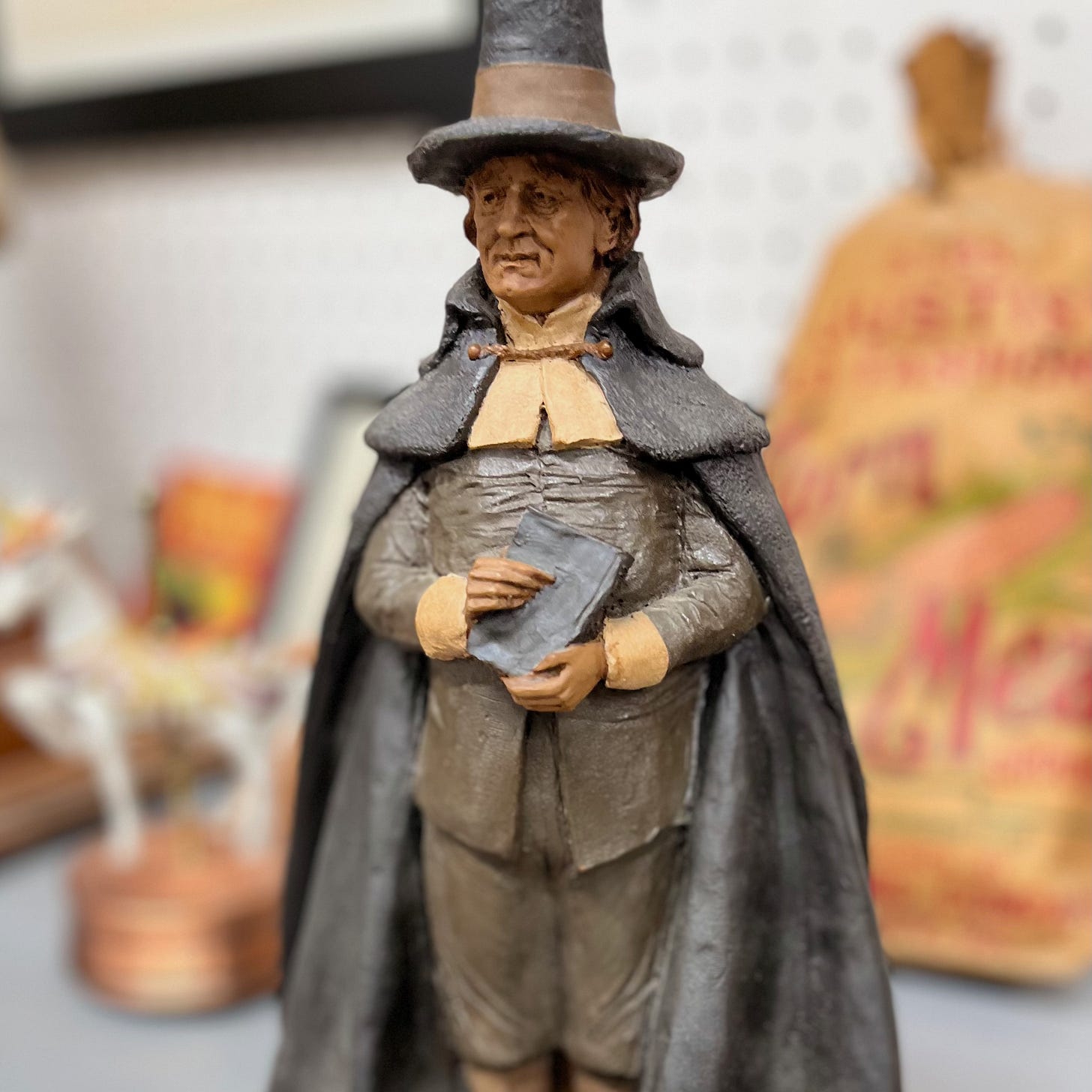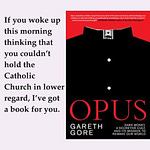Stories stick in my head. Some people remember facts or names, but all of my memories are sections of stories, connected to their origin rather than standalone pieces of knowledge. For instance, I don’t just remember most Bible stories, I also remember the ancillary stories contained in the homily. That’s where I learned the origin story of confession.
During the Roman persecution, the police would raid churches. Often, if you renounced Christ, they’d let you off with a warning. If you didn’t, you could lose a finger, get a leg broken, or some other perfectly reasonable response to a metaphysical disagreement. The next time you all got together at the next secret church, those with unbroken legs had some explaining to do to their maimed brethren.
A quick aside, I never spell the word “church” without remembering my third-grade teacher telling us you could remember how to spell it by thinking of “ch” reassuring itself that it was “ch.”
The priest’s confession history could be apocryphal. I’ve written elsewhere that the Christians were so into getting punished, martyrdom became a fad and one emperor was bored of torturing them. Take all my “history of the Church” facts with a grain of salt, but they’re knocking around in my head why shouldn’t they knock around in yours?
Bible stories (and really all parables) are poorly written and conceived. They’re like Cheetos, an indelible delivery system heavy in spiritual calories but with scant spiritual nutrition—all whats and no whys.
One homily that’s bothered me since childhood contained a parable I can’t find or source. In the 1980s there was this Catholic evangelical movement called “Renew.” It was as if they adopted a more youth-oriented, hipper approach in response to calls to make the church less rape-y.
One of the results was some priests would come downstage for the homily, delivering it from the floor rather than the pulpit. Others stayed on the pulpit but adopted a more folksy approach, spinning yarns more than preaching. That’s the kind of sermon from which sprang the brief history of confession, and also where this baffling parable entered my life.
I’m, like, 90% sure it’s Middle Eastern, and hope some of you recognize it at once. If you do, please attribute my ignorance to the distance of time between me and a story that never made sense to my pre-adolescent self.
Here’s the shortest version I can manage:
There was a man who threw a lavish banquet and his friend, running late after a long day farming, showed up in his grimy work clothes, and rushed to take his seat. No one passed him food or made conversation. He took the hint, went home, and returned in his finest clothes only to be welcomed by the master of the house and seated in a place of honor. When the food came his way he tried sticking a drumstick in his jacket saying, “Eat little coat! Eat!” Once he had everyone’s attention the farmer said something like, you clearly wanted these clothes here more than you wanted me here.
The story’s narrative looks and plays like a Mr. Peabody and Sherman cartoon in my mind. I remember the priest saying “Eat, little coat! Eat!” in a high-pitched voice.
As far as I can recall, the moral was that we get too caught up in the superficial. In other words, the host and guests were wrong to mistreat a friend who showed up filthy to a party. I remember thinking how absurd a story it was. If the guy could go home, shower and change and come back before dinner was over, surely showing up 30 minutes late with apologies would have been better. Moreover, this was church. Literally, the one place everyone wears their best clothes.
I was just in court (story to follow) and noticed people don’t dress as well for court as they do for church. That was actually where the priest’s sermon story started to unravel for my younger self. I couldn’t imagine the horror on my grandmother’s face if I attempted to wear “play clothes” at church.
Older me knows that if I had, even though we heard that stupid story about feeding the coat the week before, it would have reflected poorly on my parents (neither of whom sullied their Sundays with church) for sending such filthy children into God’s presence. Within that simple parable was an indictment of the entire congregation, and it passed right over their heads.
For me, as a naturally late person, it created an impossible divide. While my congenital tartiness might seem inconsiderate from a certain perspective, the fact is time doesn’t happen to me. I can lose 20 minutes between grabbing my keys and starting my car and there’s nothing to be done for it. If it’s rude, it’s unintentionally so. I lack the gene that makes people care about being on time such that worrying about being late only grips me when they’re jail time involved.
Noticing that the clock is ticking, I’ve pushed meetings back 15 minutes so I could shower. There’s no telling the number of times I ran five minutes behind (I don’t even count five minutes as late but I understand some people do) because I had to iron my shirt.
Lately, I’m interested in whether and to what degree this parable influenced my belief that it’s ruder to show up unshowered than it is to show up late. Not to knock my mother or her side of the family, but I came up in a culture of clean and ironed but late. There was a point in my teens where I suspected an intentional egregiously late oneupmanship between my mother, her aunt, and her cousins.
For the longest time, the parable of the dirty farmer seemed too absurd to be real. A recent internet search turned up something a lot more interesting that helped me rethink parables.
The AI Godhead
When I decided to write about the parable, I chose to see if I could find the original telling using Gemini, Google’s AI machine. I use AI for my work, mostly ChatGPT to rewrite awful press releases while keeping my soul intact and my mind on other things.
For research, Gemini is the most helpful. There’s something gross about it too, reading other people’s work for free and giving the answers along with links that will rarely be clicked upon, but for now, think of Gemini as what you always thought Google could be. It’s great for reducing what used to count as research to the equivalent of asking your mom how to spell a word when you were doing your homework.
I thought if I described the parable to Gemini, it would recognize it immediately and tell me the “real” story.
Gemini misunderstood and instead took my query to be the outline for a story I wanted it to write for me. I know that people do this, and god bless them. I’m sure they’re also undefeated in solitaire, but using AI to write original stuff isn’t something I’d ever tried or considered. Imagine my surprise when I got this parable back:
Old Jebediah was a man of the soil. Sun-baked and calloused, he spent his days coaxing life from the earth. His clothes, a patchwork of browns and greens, mirrored the fields he tended. One crisp autumn evening, Jebediah sat by the crackling fire, his worn coat draped over a chair. He reached into a sack of grain, intending to fill his belly, but a peculiar notion struck him.
“Here you go, old friend,” Jebediah mumbled, stuffing a handful of barley into the coat’s pocket. “A good harvest deserves a good meal.”
His wife, Martha, a woman with eyes as sharp as her wit, watched him with a raised eyebrow. “Jebediah,” she chuckled, “Coats don't eat, they wear.”
Jebediah blinked, bewildered. “But Martha, it’s worked hard all season, protecting me from the elements.”
Martha sat beside him, her smile softening. “It has, dear. But coats find strength from being washed, mended, and kept dry. Not from barley.”
A slow realization dawned on Jebediah’s face. He looked at his own grime-caked clothes, then back at the coat, now dusted with stray grains. Shame flushed his cheeks. He hadn't taken care of himself, focusing solely on the coat that shielded him.
The next morning, Jebediah surprised Martha by emerging in clothes washed and mended. He carefully brushed the dust off the coat and hung it outside to air. He understood then, true care starts from within. A strong body needs proper nourishment, just as a good coat needs proper upkeep. They both work together, one providing comfort, the other providing the strength to endure.
From that day on, Jebediah took better care of himself and his belongings. He learned that neglecting the foundation weakens the whole structure, and that true strength comes from tending to both the seen and the unseen.
This was the first thing I’ve ever read that didn’t reek of AI, but it makes sense. It’s a parable. One of the oldest story structures on the planet. There are no licensing issues to negotiate, no Terms and Conditions with which to contend, just load up every religious text and fable ever written and AI can crank out children’s books and bumper stickers until you’re tired of being a writer.
Even though I didn’t get the story I was after, I think my commentary is going to remain the same: contrary to what we were told in church, parables weren’t told among people for entertainment. They were starting points for indoctrination. Stories told top-down that provoke questions and kill curiosity all at once.
A lifelong farmer who never learned to care of his gear? A farm wife with eyes “as sharp as her wit” who went an entire marriage without mending or washing her husband’s coat? Was this the first time he tried to feed his coat or just the first time she noticed him speaking aloud to his garment? The questions are endless.
Parables are complex mnemonic devices for morals. Even AI, which has read and remembered every parable ever written, noticed this as a defining attribute. The moral isn’t the logical endpoint of the story, the kernel of truth toward which the story flows. Instead, the story is a cobbled-together something concocted purely as an excuse to present the moral.
Think of the Christian parable, “The Prodigal Son.” If you don’t know it, it features a selfish, spoiled boy who demands his inheritance in advance and the doting father who grants it. The kid goes off, blows the money on hookers and booze and, when he returns home years later, the father (who has become even wealthier thanks to the son who stayed home) throws him a party. The spoiled boy’s brother is quite reasonably upset at the father’s credulity and is shamed for it.
The moral of the story is that no matter how heinous and selfish your behavior toward your family, your father’s forgiveness is always there for the asking. The moral, apologize and be forgiven, doesn’t follow from the text.
In both real life and fiction, there would have to be some resolution with the brother. Without it, the story is: young man behaved very badly, said he was sorry, and everyone lived happily ever after the end.
Setting aside the brother, in real life the prodigal pilfers his father’s prized whatever a week later and leaves again, sells it for drugs, overdoses, and is found behind a dumpster. Or he uses it to bet on a long shot to pay off his bookie, the long shot doesn’t come in, and he’s found behind a dumpster.
I don’t know whether pointed, spiteful ingratitude can be forgiven. It’s not an act, some sin a person committed, it’s a character flaw so common as to be tropey.
It’s the kind of behavior we ascribe to the kind of person who always gets found behind a dumpster as if they’re bound by narrative gravity. But even though that’s what the story is “about” the moral isn’t decrying spiteful ingratitude, the tale lauds its forgiveness. The narrative is a colorful distraction, filler to give the moral apparent weight or reason.
This isn’t a criticism claiming parables are bad because they contain too many resolved conflicts. Their intentional stupidity is a crucial part of what makes them so insidious. One thing that these three parables have in common is their absurdity. If you check the Bible, it was apparently parable day around the campfire as, according to Luke, Christ knocked out hit after hit without context or preamble.
It might make the most sense to think of parables like they’re Zen koans, created for focusing your mind on the intentionally oblique so enlightenment slips in through the cracks where your sense of order used to be.
Alternatively, maybe they were ancient icebreakers where we all try to figure out what we would have done if we were in that situation, like deciding that having a bath was much more important than being on time.
Keep the faith,
Tony
PostScript
If my mother is reading this, she’s fuming, so I have to clarify that for the sake of the narrative, I said both my parents never “sullied” their Sundays with church. In fact, my mom went to her church (she’s protestant) whenever she could. It’s just that, between coaching our soccer teams and having at least one baby in the house from 1970-1992 (I am the oldest of six boys), she didn’t make it as often as she would have liked during the high chaos of the Russo house in the late 1970s and early 1980s.
The sad irony is that, when her mother died, and there was no one to “make” us boys go to church, we mostly stopped. She went from going once or so per month to attending every Sunday. She’s been going ever since. She’s there as I type this.
On the flip side, I think the number of times my father went to church after his mother stopped making him go is in the double digits.
Similarly, on the congenitally late claim, it’s worth mentioning that between my mother, her cousin, and her aunt in the late ‘70s and early ‘80s there were 13 or so kids.
I had never considered that my tendency to be late rather than rumpled or unshowered could be tied to some dopy side story I heard when I was a kid. If you’re wondering how I got to court on time it was by barely sleeping the night before in terror of going to literal jail and having my life ruined for being late. That kind of pressure isn’t sustainable, though.











